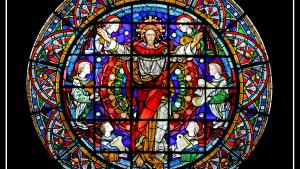Introduction
As we study these passages keep in mind what the Bible has already told us about the incarnation. In Isaiah 7:14 and 9:6 we are told that God will become a human being and what some of the characteristics of the incarnation will be. In John 1:14 we have the New Testament perspective on that: God becoming man. As we study these passages we’ll be using an inductive method, sometimes called the “OIA” method: O for observation, I for interpretation and A for application.
Hebrews 1:1-4
1 Long ago God spoke to our ancestors in many and various ways by the prophets, 2 but in these last days he has spoken to us by a Son, whom he appointed heir of all things, through whom he also created the worlds. 3 He is the reflection of God’s glory and the exact imprint of God’s very being, and he sustains all things by his powerful word. When he had made purification for sins, he sat down at the right hand of the Majesty on high, 4 having become as much superior to angels as the name he has inherited is more excellent than theirs.
Questions for Discussion
1-2a: What is the contrast the writer to the Hebrews (herein after referred to as H) develops here? Is this merely a sequence of revelation or is more being said?
2b: Just how “big” is the Son here?
3a: What is the relation of the Son to God in this passage?
3b: Put this in more contemporary language. How does this relate to the natural sciences?
3c: What images might this line call up to the minds of the recipients of the letter to the Hebrews? What does it call to your mind?
4: Why might H be arguing the superiority of Jesus? Why to angels? Is this relevant today?
Hebrews 2:9-18
9 But we do see Jesus, who for a little while was made lower than the angels, now crowned with glory and honor because of the suffering of death, so that by the grace of God he might taste death for everyone. 10 It was fitting that God, for whom and through whom all things exist, in bringing many children to glory, should make the pioneer of their salvation perfect through sufferings. 11 For the one who sanctifies and those who are sanctified all have one Father. For this reason Jesus is not ashamed to call them brothers and sisters, 12 saying, “I will proclaim your name to my brothers and sisters in the midst of the congregation. I will praise you.” 13 And again, I will put my trust in him”. And again, “Here am I and the children whom God has given me.”
14 Since, therefore, the children share flesh and blood, he himself likewise shared the same things, so that through death he might destroy the one who has the power of death, that is, the devil, 15 and free those who all their lives were held in slavery by the fear of death. 16 For it is clear that he did not come to help angels, but the descendants of Abraham. 17 Therefore he had to become like his brothers and sisters in every respect, so that he might be a merciful and faithful high priest in the service of God, to make a sacrifice of atonement for the sins of the people. 18 Because he himself was tested by what he suffered, he is able to help those who are being tested.
Questions for Discussion
9: What all do we learn about Jesus from this verse? What “theology" is suggested here?
10: Why is death and suffering so important in this passage?
11-12: What association is H making in “holy” and “brothers”?
13-14: How does the image of “children," "death," and the "devil" illumine the idea of incarnation for us?
15-18: How does H show the everyday character of the incarnation here?
Application
Describe a way you could express the incarnation (indirectly) in one of your days of teaching, research or service at the university.
Have you experienced an “incarnational” professor anywhere? What made him/her incarnational?
Image courtesy of Fr Lawrence Lew, O.P. on flickr.


